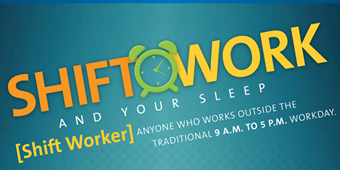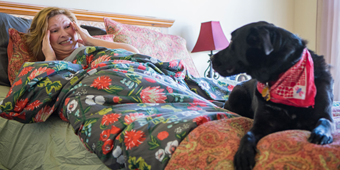Help For Restless Legs And Sleepless Nights

Find Your Perfect Match
Answer a few questions and we'll provide you with a list of primary care providers that best fit your needs.
As sufferers of restless legs syndrome (RLS) know, few things can get us off track as quickly as the inability to get a good night’s sleep. How can you calm those unruly limbs and get back to peaceful slumber?
RLS – also known as Willis-Ekbom disease – is a neurological disorder. You feel unpleasant sensations in your legs and an almost irresistible need to move them. People describe the feeling many ways: itchy, jumpy, creeping, crawling, pulling, throbbing and more. In severe cases, your torso and upper body can also be affected, says Julio Soto, MD, FAAFP.
Symptoms most often show up late in the day. You might be relaxing on the sofa or lying in bed looking forward to a good night’s sleep when, suddenly, that itchy throbbing starts. And when RLS strikes, the only way to get relief is to move those legs! You might need to stand up and walk around or keep your legs in motion while you’re sitting or lying down.
It’s easy to see why RLS can lead to sleepless nights.“Your partner may also end up having sleepless nights,” says Dr. Soto. “For many, RLS can cause a lot of stress.” Because it makes sleep so difficult, RLS can lead to daytime fatigue and, potentially, a host of related problems, from work issues to impaired memory and even depression.
RLS sufferers are not a small club. Up to 10 percent of the U.S. population may have RLS, with moderate-to-severe varieties affecting some 2-3 percent of adults. Though it’s often not diagnosed until middle age, RLS affects people of all ages, and about twice as many women as men.
If RLS is keeping you awake at night, talk to your doctor.
What’s Going On Here?
Doctors haven’t pinpointed the precise cause of restless legs syndrome. Since it sometimes runs in families, it may have a genetic component. The brain may also play a role. Low iron levels may be a factor, as well as a dysfunction in the part of the brain that uses dopamine to produce smooth, purposeful muscle movement. And though researchers cannot link them directly, RLS seems to have some connection to:
- Kidney failure, diabetes, and peripheral neuropathy
- Medications that could aggravate symptoms (including some anti-nausea drugs, some antipsychotics, and certain cold and allergy remedies)
- Pregnancy, particularly during the last trimester
- Alcohol use and sleep deprivation
- Age and gender. Women are more likely to get RLS, especially as they get older, Dr. Soto reports.
Do I Have Restless Legs Syndrome?
To diagnose RLS, physicians ask four key questions:
- Do you have a strong desire to move your legs, accompanied by abnormal, often unpleasant sensations?
- Are your symptoms worse at night and better, or gone entirely, in the morning?
- Are your symptoms triggered by rest, relaxation, or sleep?
- Are your symptoms relieved by movement?
Unfortunately, there is no blood test to determine if you have RLS, says Dr. Soto. However, your doctor may want to check the level of iron in your blood, as iron deficiency is one possible cause, he explains. To make a diagnosis, your doctor will likely rely on a physical exam, how you describe your symptoms and how they vary through the day. You might have a neurological exam or tests to rule out other conditions. Your doctor might also ask you to take part in a sleep study.
to determine if something other than RLS could be disturbing your rest.
How To Treat Restless Legs Syndrome
There is currently no cure for RLS, but a variety of treatments and therapies can help to relieve symptoms so you can get a better night’s sleep. Talk with your doctor about these options: 
- Treating underlying conditions. You may have a medical condition of which you aren’t even aware. “It’s possible that if we discover and treat that condition, say diabetes or peripheral neuropathy, in doing so your RLS will improve,” says Dr. Soto.
- Lifestyle changes. “If your symptoms are mild, we encourage exercise, stretching, a warm bath before bedtime, and cutting back on caffeine, alcohol and tobacco,” Dr. Soto recommends. Supplements can address vitamin and mineral deficiencies. Try to keep to a regular sleep schedule and limit or avoid naps.
- Medications. Medicine can help, but no one medication does the trick for every person with RLS. The FDA has approved a variety of drugs to treat RLS, and other medications that are not specifically designed to treat RLS can sometimes help. Ask your doctor about possible medical therapies.
“Or sometimes we discover that a medication you’re taking for another condition could be causing your restlessness. After getting your thorough medical history, your doctor may want you to switch to a different medication to see if that might minimize your restless legs,” Dr. Soto adds.
The Restless Legs Syndrome Foundation offers a number of coping strategies that can make life with RLS more bearable. Among other things, they suggest talking with others about RLS, keeping a sleep diary and tracking your daily activities, keeping your mind engaged and active, and beginning and ending each day with stretching or gentle massage. They also encourage you to consider joining or starting a support group. There are many RLS groups throughout the United States.
To learn more about Restless Leg Syndrome, talk to your doctor or health care provider or search for a provider.
Find Your Perfect Match
Answer a few questions and we'll provide you with a list of primary care providers that best fit your needs.
Source: Julio Soto, MD, Upper Valley Family Medicine; Restless Legs Syndrome Foundation; National Institutes of Health





